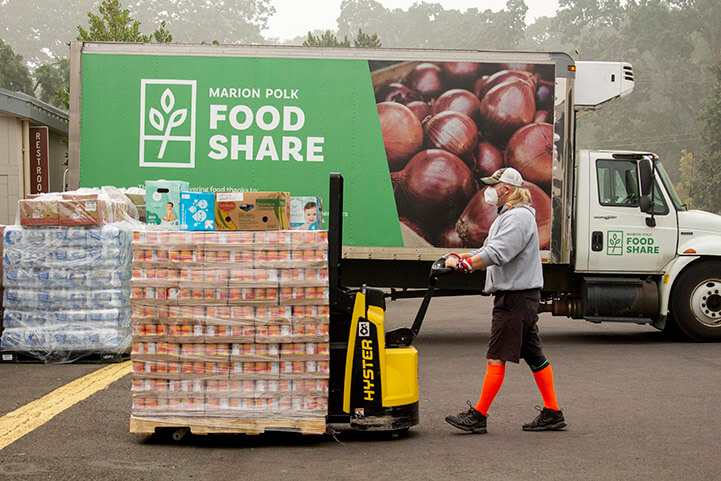Marion Polk Food Share Served Record-high Numbers in 2023: “Nothing good happens when you’re hungry.”

In 2023, Marion Polk Food Share distributed a record-high 10 million pounds of food, providing $14 million in relief to 18,000 households monthly, another record high.
In an interview with the Salem Business Journal, Marion Polk Food Share President and CEO Rick Gaupo discussed the changing landscape of food banks, economic trends causing record hunger levels, and Food Share’s impact on homelessness and hunger, along with ways for individuals and businesses to contribute.
What food do you picture?
A person who shows up to a Marion Polk Food Share food bank, known as a neighborhood pantry location, will receive a three-to-five-day food box filled with nutritious meals that will allow the person and their family to work, learn, and thrive. Salem is home to over 20 of the 50-plus pantries that operate out of churches and nonprofits in 18 Marion Polk communities, all run by volunteers.
Outdated assumptions about food banks are a thing of the past. “We picture food banks full of mostly damaged, dented cans of processed food and hamburger helper,” said Gaupo. “We’re not talking boxed macaroni and cheese. We’re talking about the things everyone gets at the grocery store.”
Marion Polk Food Share stocks 40% of their food bank supply with fresh and frozen foods that mirror the same fruit and vegetables, meats, milk, and dairy products in season at your local grocery store. The other 60% is quality products made possible by their large-scale donation system to prevent food waste and maximize community collaboration.
Donation does not equal damage. “The food production system has intentionally built surplus into it. A farmer has to grow more than they need to meet a contract quota,” said Gaupo. “A grocery store must keep a surplus on hand to avoid selling to the last item. We pick up the surplus.”
Marion Polk Food Share is regional, meaning it obtains 70% of its supply from farms, food processors, grocery stores across the region, and even individuals. Government assistance food makes up the rest.
Gaupo shared stories of fabulous community partnerships, such as Top Hat Mushrooms, which generously donated pallets of shiitake mushrooms. These mushrooms, valued at $8 per pound in local grocery stores, were just one example, alongside other stories of semi-truck surprise deliveries.
“It excites me to think about someone who came to their local food bank and said, ‘Oh my goodness. I can put shiitake mushrooms in my stir fry tonight,’” said Gaupo. “They walk in to see an awesome collection of different meats. Or we will get a semi-truck full of milk, dairy, and yogurt. It’s all because of generosity.”
The quality food that is collected is estimated at wholesale value, which Gaupo points out the $14 million from 2023 alone would be even higher at its retail value.
Whose faces do you picture?
“We picture food banking as mainly feeding homeless people or people without housing,” said Gaupo. “But 75% to 85% of people served are already in their home – not predominantly homeless – and trying to stay in their home.”
The changing food bank landscape includes reducing the social stigma of persons seeking help with debt burden relief and budget relief.
To understand the economic realities of hunger, Gaupo looks to the adage, “When you’re hungry, you have one problem to solve. If you’re full, you have many.”
Marion Polk Food Share delivered more food to a record number of people in 2023 because inflation has made food and housing costs 20% higher than before the pandemic. Pandemic government assistance safety measures like SNAP, child tax credits, unemployment assistance, mortgage and renter protections, and business payroll protections have now gone away, adding to record-high numbers.
Gaupo wants the community to understand the value of Marion County Food Share as a measure to prevent homelessness. Higher barriers exist to obtaining rent assistance, childcare assistance, or higher wages. “Food banks are a low barrier program, meaning, if you come to a pantry, we believe you need assistance,” he said.
Another lesser-known aspect of Marion County Food Share is how it supports other faces, including nonprofits like ARCHES, Union Gospel Mission, Simonka Place, and Church in the Park. This support is achieved through food delivery donations, providing budget relief, and strengthening their capacity.
What community do you picture?
Gaupo said that people might think Food Share is simply solving hunger problems. Instead, he said, they are trying to make the “boldest impact with the most passionate vision that the community allows.”
Their vision for impact continues to innovate and reach beyond the food bank model. They have congregate meal sites where people come together to share meals, over 50 Marion Polk community gardens to grow food, Meals on Wheels for seniors and disabled adults in Salem and Keizer, a Senior Grocery Program that delivers monthly groceries, and a six-acre urban Youth Farm in Salem in partnership with Chemeketa Community College and Oregon State University.
Gaupo wants everybody – individuals and businesses – to know they can profoundly impact hunger in the community by giving money, time, and food.
The vast majority of Marion Polk Food Share’s budget comes from the support of donors who give $10-$25 per month through the Sustainer Program. Gaupo said it reminds him of the idea that we stay nourished by eating small meals each day, seven days a week, and the same principle is true when fighting hunger.
But a fourth way that is often overlooked is to vote for politicians who will elevate the concern for hunger in our community.
Gaupo suggested asking politicians: “Will they support hungry children in schools so they can focus on learning? Will they ensure my employees can come to work without hunger being their main concern?”
Food Share is stewarding the community’s goodwill to respond to hunger.
“What kind of community do you want to live in?” said Gaupo. “Because nothing good happens when you’re hungry.”
Visit https://marionpolkfoodshare.org for a list of meal sites, learn how to donate food, volunteer opportunities, and ways to give.




